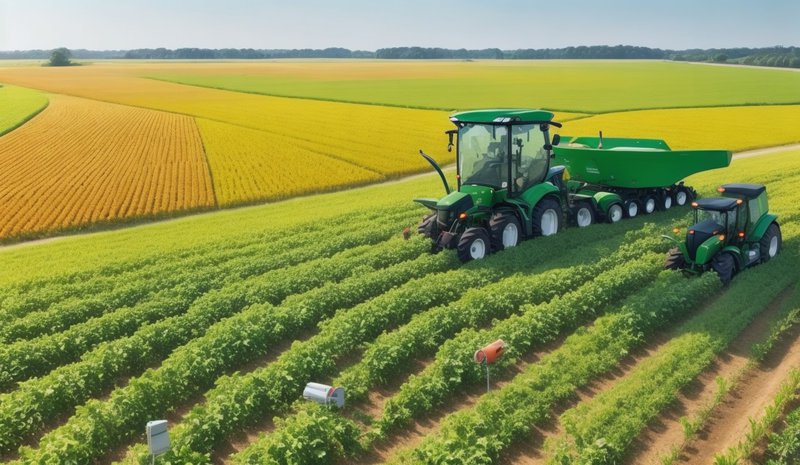Can IoT Revolutionize Agriculture and Farming Practices

Do you ever wonder how technology can transform the way we grow our food? Well, get ready to be amazed because the Internet of Things (IoT) is here to revolutionize agriculture and farming practices.
With IoT, you can now monitor crop growth, manage livestock, optimize irrigation systems, and improve supply chain management.
In this article, we will explore the incredible potential of IoT in transforming the agricultural industry and how it can make farming smarter and more efficient.
So, let’s dive in and discover the future of farming!
Key Takeaways
- IoT in agriculture enables real-time monitoring and control of irrigation, fertilization, and pest control, optimizing crop conditions and maximizing yield while minimizing losses.
- Livestock management is revolutionized with IoT, allowing for real-time tracking of environmental factors and livestock health status, leading to improved overall management practices.
- Smart irrigation systems powered by IoT provide real-time data on soil moisture levels, reducing water wastage, lowering costs, and promoting sustainable farming practices.
- IoT in supply chain and distribution ensures product quality throughout the supply chain, increases consumer confidence in safety and authenticity, and enables efficient and safe market distribution of agricultural products.
The Role of IoT in Precision Farming
In precision farming, IoT can revolutionize your agricultural practices by providing real-time data and insights to optimize irrigation, fertilization, and pest control.
Sensor integration for soil monitoring is a crucial aspect of precision farming. By using IoT-enabled sensors, you can continuously monitor soil moisture levels, nutrient content, and pH levels. These sensors can provide accurate and timely data, allowing you to make informed decisions about irrigation and fertilization.
Remote monitoring and control for precision agriculture is another key benefit of IoT. With IoT devices, you can remotely monitor and control various aspects of your farm, such as irrigation systems, temperature and humidity levels in greenhouses, and even pest control mechanisms. This enables you to make adjustments and interventions promptly, ensuring optimal conditions for your crops and maximizing their yield.
IoT Applications in Livestock Management
Take advantage of IoT applications to improve your livestock management practices. With the help of IoT, you can revolutionize the way you handle your poultry farming operations.
By implementing IoT solutions, you can monitor and control various aspects of your poultry farm remotely, ensuring optimal conditions for your birds. IoT applications in poultry farming can help you track environmental factors such as temperature, humidity, and lighting, ensuring the right conditions for the birds’ growth and health.
Additionally, IoT solutions for herd health monitoring can enable you to track the health status of your livestock in real-time, detecting any signs of illness or distress early on.
Enhancing Crop Management With Iot Technology
By implementing IoT solutions, you can greatly improve the management of your crops. With smart pest control systems, you can effectively monitor and control pests that can cause significant damage to your crops. These systems use sensors and actuators to detect pests and automatically apply targeted treatments, reducing the need for harmful pesticides.
Soil monitoring is another key area where IoT technology can make a big difference. By using sensors to measure moisture levels, nutrient content, and pH levels in the soil, you can ensure that your crops receive the optimal amount of water and nutrients, leading to healthier plants and higher yields. The data collected from these sensors can be analyzed in real-time, allowing you to make informed decisions about irrigation and fertilization.
Overall, by embracing IoT in crop management, you can enhance efficiency, minimize losses, and increase productivity on your farm.
IoT-enabled Smart Irrigation Systems for Efficient Water Usage
Make sure you’re maximizing the efficiency of your water usage with IoT-enabled smart irrigation systems. These innovative systems utilize smart sensors for soil monitoring, allowing you to accurately determine the water requirements of your plants. By incorporating automated greenhouse systems, you can create an optimal environment for your crops, ensuring their growth and productivity. With IoT technology, you can remotely control and monitor your irrigation system, saving you time and effort.
Here are five benefits of using IoT-enabled smart irrigation systems:
- Precise water management: The smart sensors provide real-time data on soil moisture levels, allowing you to water your plants only when necessary.
- Water conservation: By avoiding overwatering, you can significantly reduce water wastage and contribute to conserving this precious resource.
- Cost savings: Efficient water usage means lower water bills, resulting in cost savings for farmers.
- Improved crop yield: By providing the right amount of water at the right time, you can enhance the health and productivity of your crops.
- Sustainability: IoT-enabled smart irrigation systems promote sustainable farming practices by minimizing water waste and reducing environmental impact.
Improving Supply Chain and Distribution With Iot in Agriculture
Improving the supply chain and distribution in agriculture can be achieved through the use of IoT technology.
With smart packaging, traceability, and enhanced food safety, you can ensure that your agricultural products reach the market efficiently and safely.
IoT-enabled smart packaging allows you to monitor the conditions of your products, such as temperature and humidity, in real-time. This ensures that the quality of your produce is maintained throughout the entire supply chain, reducing spoilage and waste.
Additionally, traceability systems powered by IoT can provide detailed information about the origin and journey of your products, giving consumers confidence in the safety and authenticity of what they are purchasing.
Frequently Asked Questions
How Does Iot Technology Improve the Precision Farming Practices?
IoT improves precision farming practices by enabling real-time monitoring and data-driven decision making. With IoT technology, you can gather valuable data, monitor crop conditions, and make informed decisions for improved farming practices.
What Are Some Examples of Iot Applications in Livestock Management?
IoT can revolutionize agriculture and farming practices by implementing applications in livestock management. For example, IoT applications in poultry farming can monitor temperature and humidity, while in dairy farming, it can track milk production and cow health.
How Can Iot Technology Enhance Crop Management?
Enhanced monitoring and automated data collection through IoT technology can revolutionize crop management. It allows you to closely monitor soil conditions, irrigation, and pest control, resulting in improved crop yields and overall efficiency.
How Do Iot-Enabled Smart Irrigation Systems Contribute to Efficient Water Usage in Agriculture?
Smart irrigation systems, enabled by IoT, contribute to efficient water usage in agriculture. By using sensors and data analysis, these systems optimize irrigation schedules, conserve water, and improve crop yield.
In What Ways Does Iot Improve Supply Chain and Distribution in the Agriculture Industry?
Smart tracking and real-time monitoring, enabled by IoT, revolutionize supply chain and distribution in agriculture. You can track inventory levels, monitor transportation conditions, and optimize routes, leading to improved efficiency and reduced waste.






